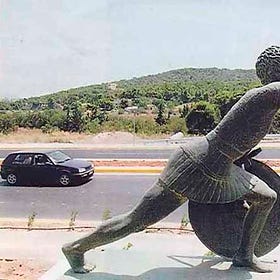Welcome to LINKS — my attempt to provide Rhapsody readers with five interesting stories that tell us something about what it means to be human. LINKS is published every Wednesday. Today’s edition is a bit different. Since it’s Global Running Day—but I can’t run because I live in New York City and it looks like the apocalypse outside thanks to smoke billowing down from Canada—I present five stories about running (including a Rhapsody essay from the archives.)
Have a link you want to share (about running)? Drop it in the comments.
One Man’s Mission to Make Running Everyone’s Sport
By Danielle Friedman, The New York Times
“Mr. Evans is the founder of Slow AF Run Club, a virtual community for back-of-the-packers with more than 10,000 members worldwide. At 300 pounds, he is a beloved figure among runners who have felt left out of the sport. He’s graced the cover of Runner’s World, posed nude for Men’s Health and appeared in an Adidas ad. His Instagram account, @300poundsandrunning, has around 62,000 followers. And this month, he’s releasing his first book, ‘Slow AF Run Club: The Ultimate Guide for Anyone Who Wants to Run.’”
When running for exercise was for weirdos
By Phil Edwards, Vox
“The police were also alarmed by this weird new hobby. In 1968, the New York Times told the story of Dick Cordier, a Hartford, Connecticut, runner who was stopped by the police for ‘illegal use of a highway by a pedestrian.’ Cordier spent a day in court fighting a ticket. Likewise, Ray Crothers, a runner in the same city, evaded the police through alleys before calling his local police department and shouting, ‘Can't I even run near my own home?’”
The Real Pheidippides Story
By Dean Karnazes, Runner’s World
“If Pheidippides had failed in his 300-mile ultramarathon, what has been called the most critical battle in history might have been lost. Thus was the battle ultimately waged and won at Marathon. Eventually, the Spartans arrived in Athens and learned of the outcome. Before they got there, a messenger—but not Pheidippides, according to scholars—had run 25 miles to deliver the good news. So why do we run 26.2? Why are we not running some 300 miles, the distance Pheidippides ran from Athens to Sparta and back? Why highlight the shorter run when a much greater feat occurred? Perhaps because in that final jaunt from the battlefield of Marathon to Athens, the mystic messenger supposedly died at the conclusion. To the ancient Greeks, nothing could be nobler than dying after performing a heroic deed for one’s country.”
Being Human: Born and Evolved to Run
By Daniel Lieberman, The Leakey Foundation
“Why did humans become such efficient long-distance runners? How can runners avoid injury? Daniel Lieberman explores how the human body evolved to run.”




